
Webinar highlights the importance of developing positivity and resilience during the Covid-19
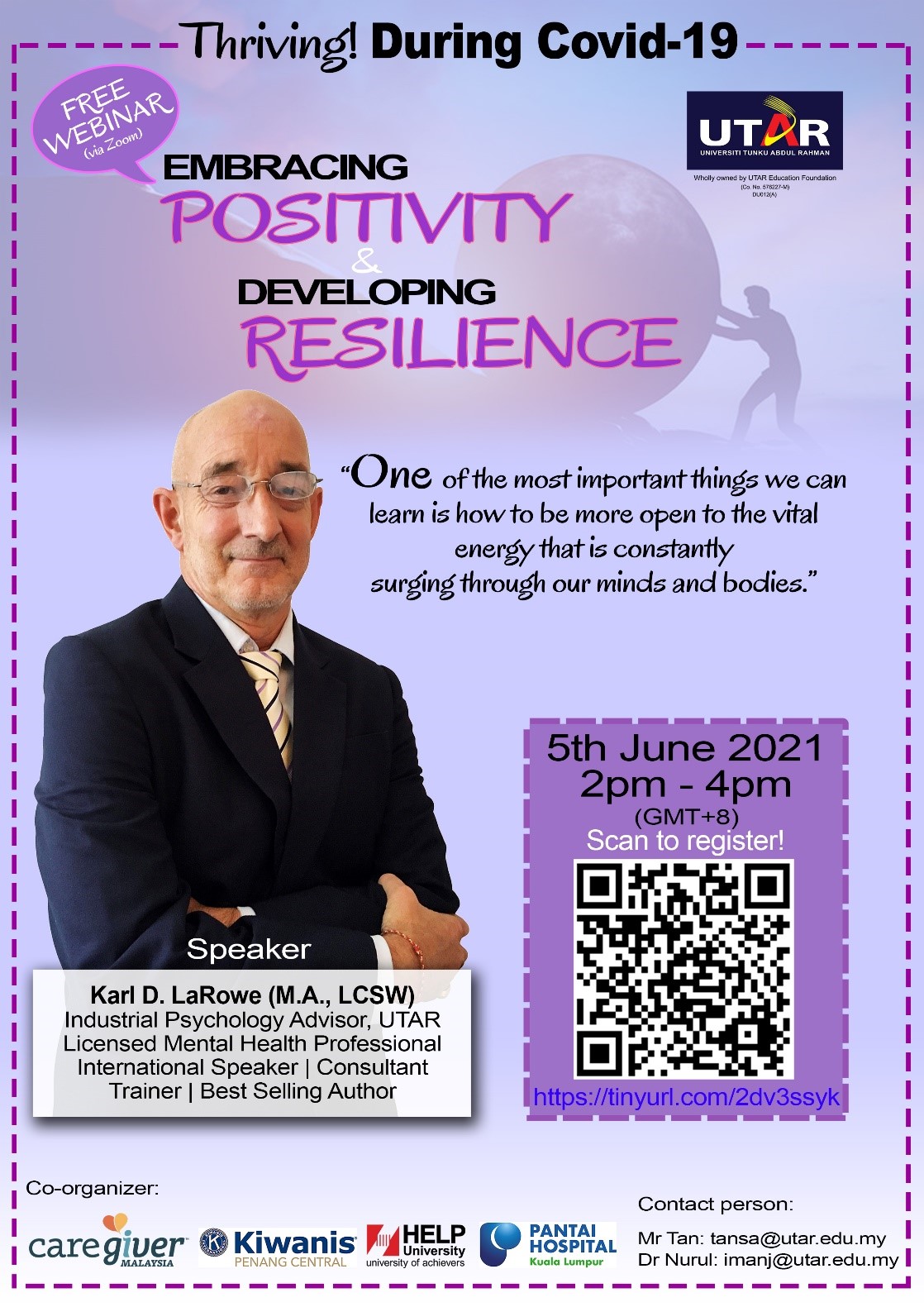
The poster of the webinar
UTAR, Kiwanis Club of Penang Central, Pantai Hospital Kuala Lumpur, HELP University and Caregiver Asia (M) Sdn Bhd jointly organised a webinar titled “Thriving! During Covid 19: Embracing Positivity and Developing Resilience” on 5 June 2021 via Zoom.
The webinar aimed to help the participants transform their mindset from “surviving” Covid-19 into “thriving” by developing their vitality, recognising their personal strengths as well as embracing and internalising their positive emotions to cultivate self-compassion and psychological resilience.
Invited to deliver the virtual talk was UTAR Industrial Psychology Advisor Karl D. LaRowe (M.A., LCSW). The webinar was moderated by Faculty of Arts and Social Science (FAS) Department of Languages and Linguistics lecturer Cheng Siew May.
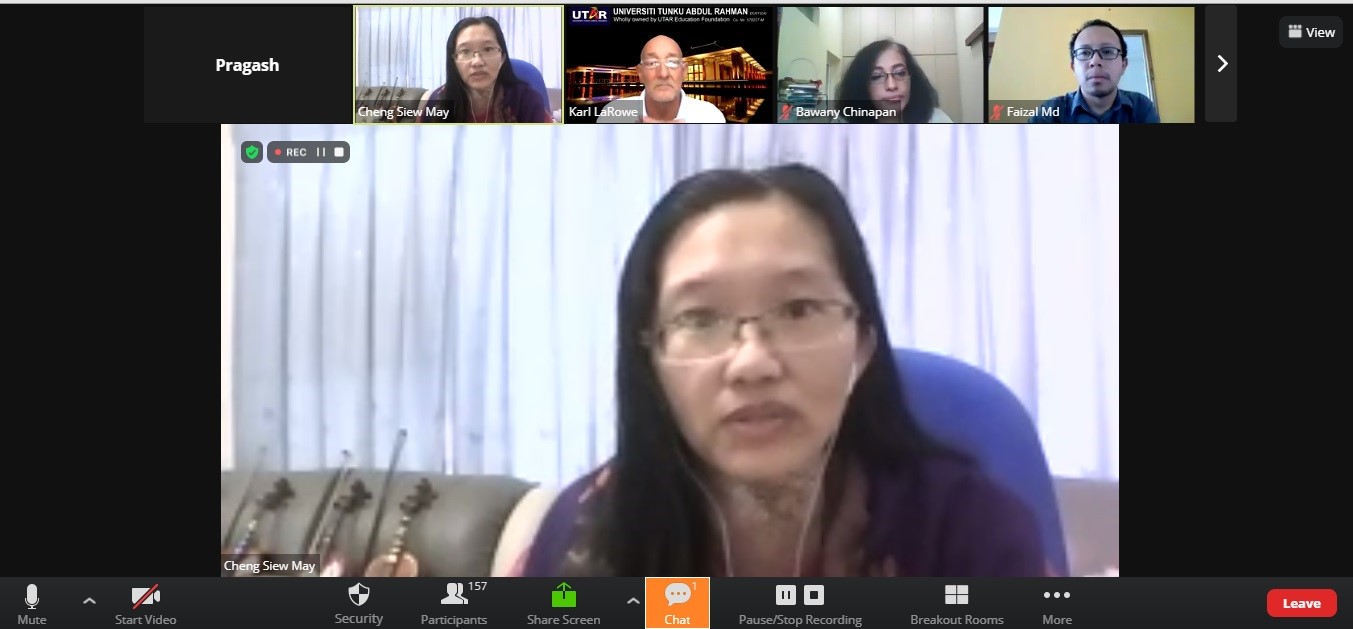
Cheng introducing Karl’s background
Cheng kick-started the webinar by introducing the speaker, “Apart from being the Industrial Advisor for UTAR, Karl is also a Licensed Mental Health Professional; he is also an International Speaker, Consultant Trainer and Best-Selling Author.” Then, she told the participants that everyone who attended the webinar will get an e-book written by Karl.
Karl began his talk by introducing the “Stress Pandemic”. According to him, the World Health Organisation (WHO) had classified stress as a pandemic before the Covid-19. It was estimated that stress costs the world economy USD250billion every year due to lost productivity. He also mentioned that the top two disabilities in the world today were depression and stress.
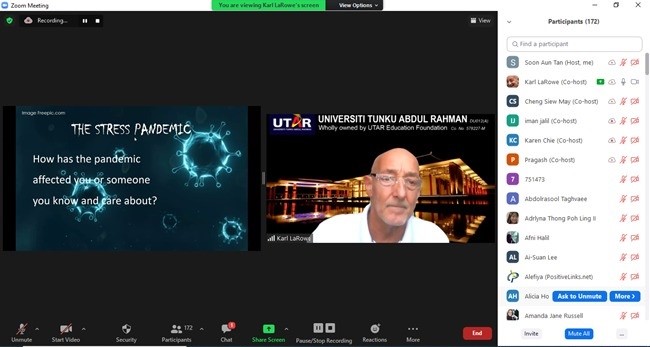
Karl telling participants that depression and stress are the top disabilities in the world today
Citing WHO (2020) Director-General Dr Tedros Adhanom Ghebreyesus, Karl said that the impact of the Covid-19 pandemic on people’s mental health is already extremely concerning. The pandemic has caused social isolation, fear of contagion, and loss of family members; people are also compounded by distress which is caused by the loss of income and often unemployment.
“The kind of stress that we are experiencing today due to the Covid-19 is called traumatic stress. The traumatic stress can result in feeling overwhelmingly anxious, angry and frustrated. It caused us to be confused besides having difficulties in concentrating, remembering, making decisions and solving problems. It could also impact how we feel about ourselves and our relationships with others. The traumatic stress could also cause serious mental health conditions such as post-traumatic stress disorder, anxiety, panic attack, depression and suicide,” said Karl.
He added, “Post-traumatic stress disorder is an intense stress anxiety disorder that happens to people who have experienced traumas such as losing someone to the Covid-19, losing a job or some other kind of traumatic event. It can result in nightmares, severe anxiety, and uncontrollable thoughts and feelings about the event which are very difficult to get over.”
Karl urged participants who are suffering from any of the symptoms above to contact a qualified mental health professional because the issues mentioned above (post-traumatic stress disorder, anxiety, panic attack, depression and suicide) are very difficult to deal with by themselves.
Speaking of post-traumatic growth, Karl explained that post-traumatic growth is the positive change experience that occurs as a result of struggling with highly challenging life crises. He said, “It is manifested in a variety of ways, including an increased appreciation for life in general, more meaningful interpersonal relationships, an increased sense of personal strength, changed priorities, and a richer existential and spiritual life.”
Research shows that post-traumatic growth can also be a catalyst for embracing appreciation of life, improved relationships with others, new possibilities in life, personal strength and spiritual change.
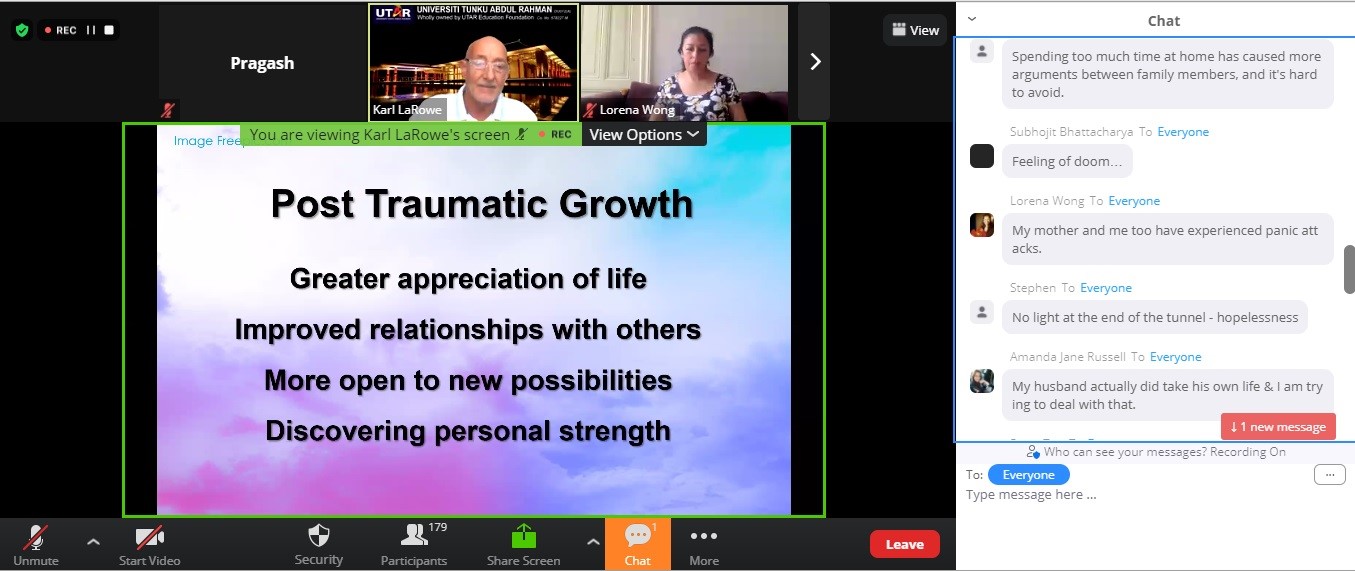
Karl explaining post-traumatic growth
Throughout the webinar, Karl recommended several key processes to thrive. The key processes include developing more vitality, positive physical and emotional energy; maximising positive emotions by transforming “Gratuitous Negativity” through the practice of self-compassion; understanding and maximising psychological strengths to develop greater resilience and discovering the “Best Self”.
Before ending his talk, Karl quoted MORExcellent Founding Director Mark Pringle and said, “This is our chance to reinvent and create a better world where we can all work, rest and play in the new normal. We cannot re-write the chapters of history since it has already passed, but we can learn from them, evolve and adapt. The new normal may even be a better normal, certainly a different normal.”
According to the event’s Chairperson-cum- Head of Master of Psychology Programme Tan Soon Aun, the participants learned to recognise how the Covid-19 pandemic has resulted in the experience of traumatic stress for many people, leading to post-traumatic stress disorder, anxiety and depression.
“Besides, the participants understood the concept of post-traumatic growth and how it led to greater vitality, strength, positivity and compassion. They also learned how to embrace and develop their vitality, psychological strengths, positive emotions and self-compassion to develop greater resilience.”
The webinar saw an active interaction between the speaker and the participants. It ended with a Q&A session and a group photography session.
The virtual talk was opened to all individuals ranging from students to working adults, non-governmental organisations (NGOs), health professionals, parents and communities. It saw 257 participants from 15 different economies, such as the Republic of Guatemala, Republic of Sudan, Republic of South Sudan, Republic of Zimbabwe, Egyptian, Republic of Mauritius, Republic of Maldives, India, Sri Lanka, Indonesia, Malaysia, Singapore, Philippines and Mongolia.
The UTAR committee members involved were FAS Head of Programme for Master of Philosophy (Social Science) Pragash Muthu Rajan, FAS Department of Psychology and Counselling lecturers Dr Nurul Iman binti Abdul Jalil and Dr Chie Qiu Ting.
To watch the video, kindly click the link: https://youtu.be/FRAkSRMerIs
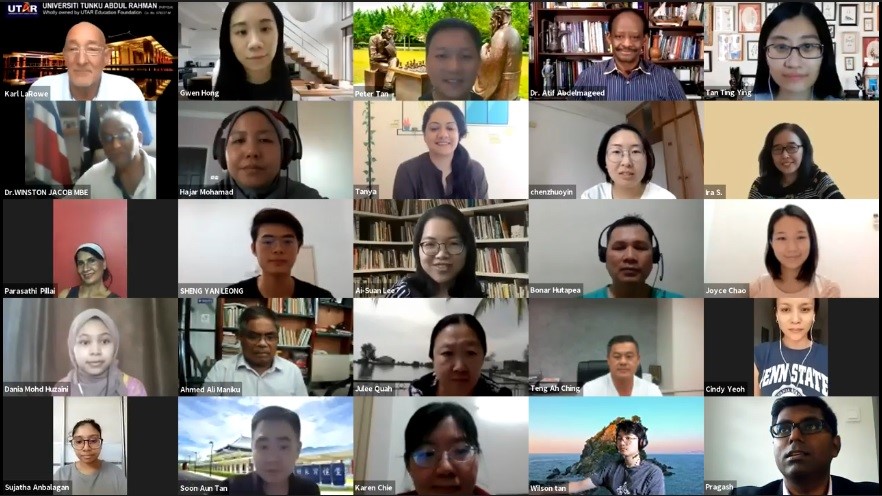
Karl (top left) with other participants
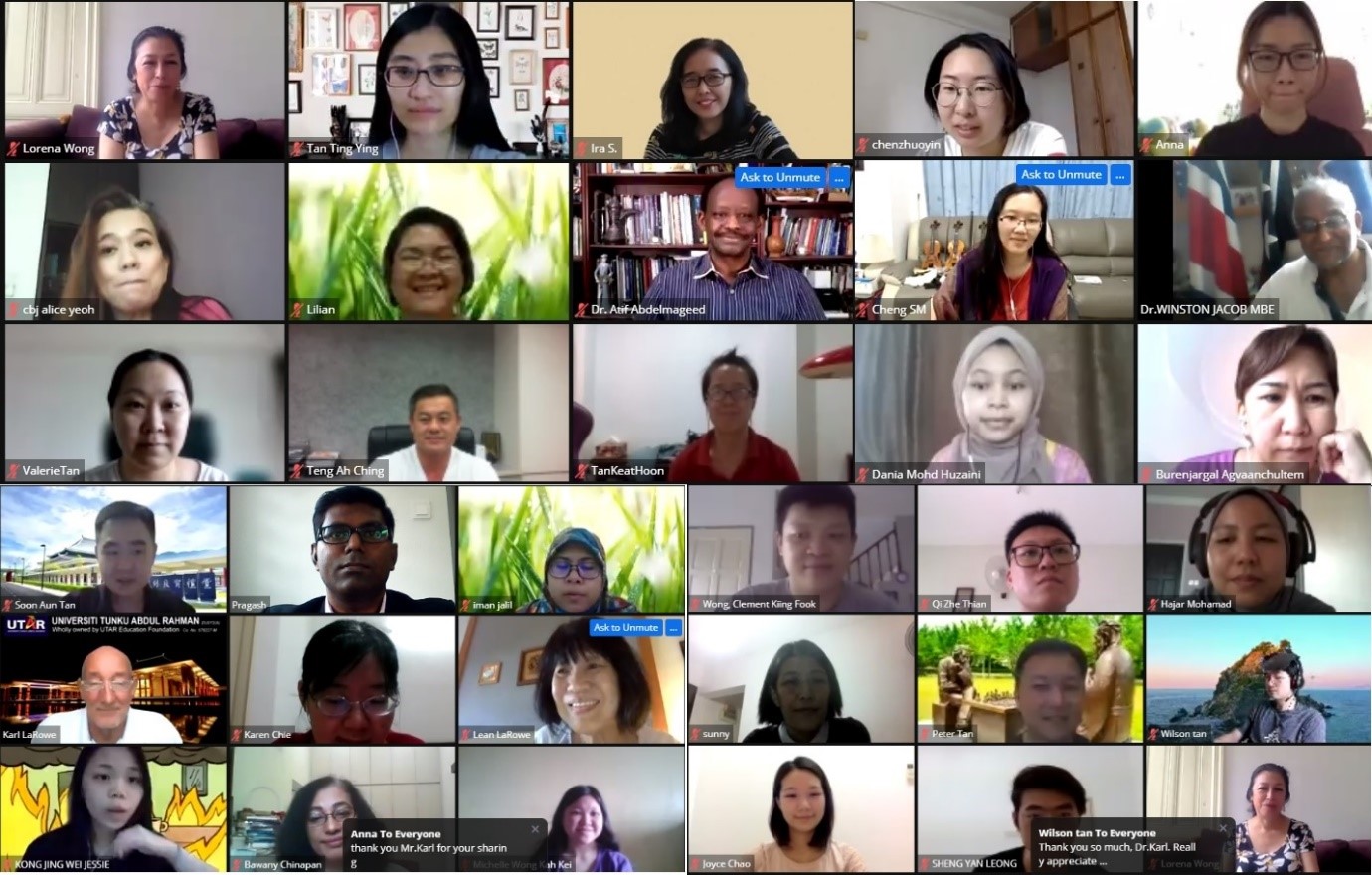
Group photo 2
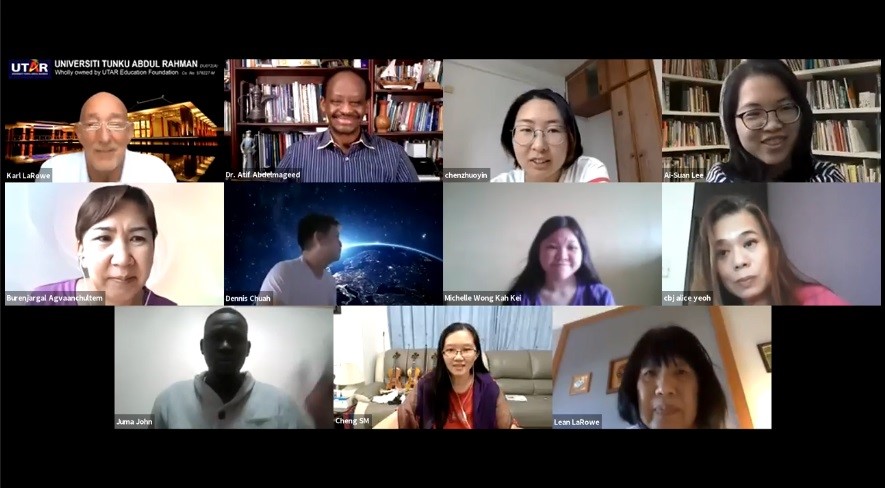
Group photo 3
![]()
![]()
![]()
© 2021 UNIVERSITI TUNKU ABDUL RAHMAN DU012(A).
Wholly owned by UTAR Education Foundation (200201010564(578227-M)) LEGAL STATEMENT TERM OF USAGE PRIVACY NOTICE